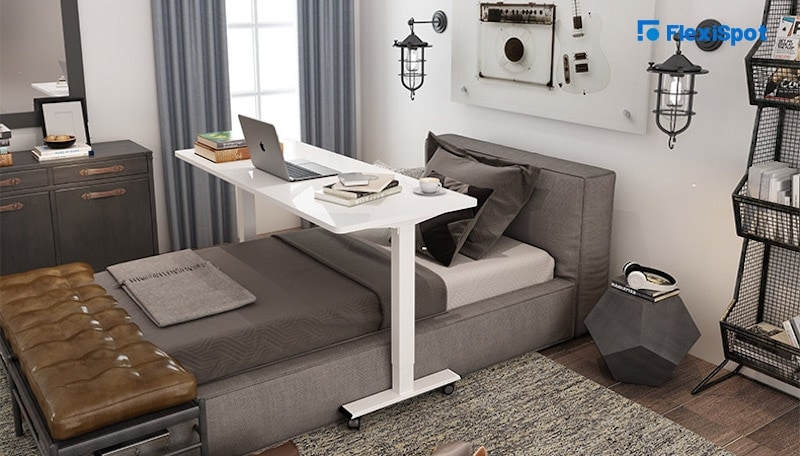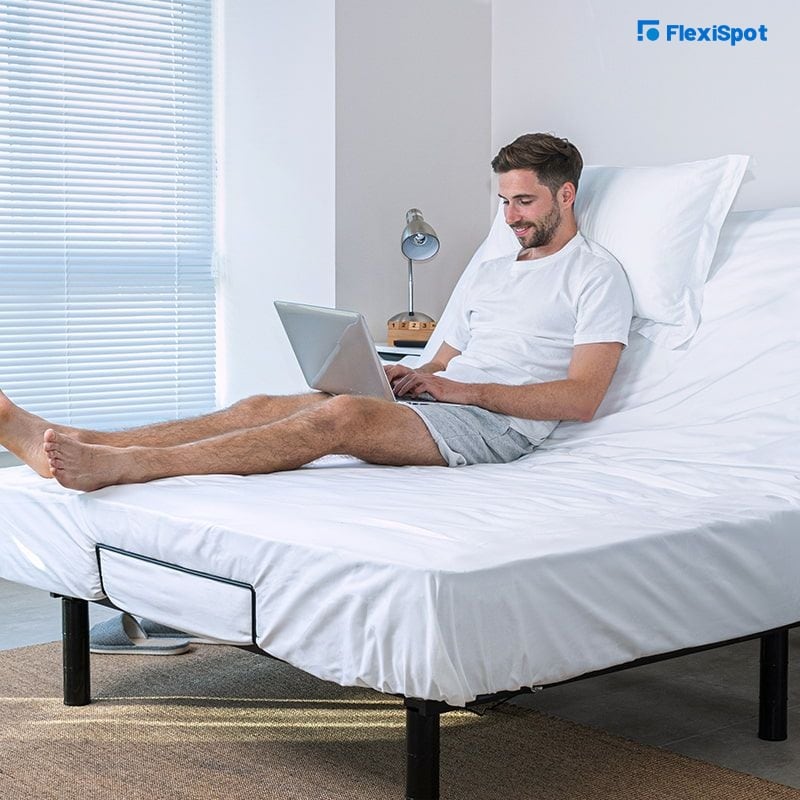If you're like me, you spend a lot of time working from your bed. It's comfortable, convenient, and, let's be honest–it’s pretty darn cozy. But is it ergonomic? According to health experts, probably not.
Unfortunately, you may not have a choice. In a situation where you have a full house with family members working and schooling from home, your bed may be the only place you can get some work done. Working from bed has also been the norm for people with chronic illnesses and injuries.
So as ill-advised as working from bed is, reality requires us to play the cards we’ve been dealt. For these unavoidable circumstances, here are a few tips on how to work from your bed in a way that won't strain your body or leave you with a crick in your neck. Give them a try and see if they make a difference for you!
Tips for Working From Your Bed
Here are a few tips on how to make the most of your working-from-bed situation:
Set Boundaries Between Work and Downtime
What usually goes wrong with work from bed situation is that a bedroom is a place we associate with relaxation. Therefore, it’s important to set clear differences between work and downtime. For instance, you can switch sides of the bed to keep your usual side of the bed as a relaxation-only area.
You can also clear out your laptop tray or bed desk and keep them out of view; the idea here is out of sight, out of mind. If the desk can’t be hidden, you can decorate it by placing a vase or something that turns it into a decorative piece. Additionally, you can use different pillows when you work so that you don’t associate your usual bed pillows with work.
Invest in a Good, Firm Mattress
If you're working from your bed, it's important to ensure that your mattress is firm enough to support your spine and keep your body in a neutral position. A soft mattress will cause your spine to curve, which can lead to back pain and other health issues. If your mattress isn't already firm, you may want to consider adding a firm mattress topper/Mattress pad for extra support.
Sit Up Against Supportive Pillows
One of the biggest issues with working from bed is that it's often easy to slouch or slump over, which can cause pain in the neck and shoulders. To avoid this, try sitting up against some supportive pillows. This will help keep your spine in a neutral position and prevent any unnecessary strain.
A good pillow for working from bed should support your spine, especially your lower back. It’s better if it’s long enough to conform to your spine from your shoulders down to your lower back. The goal is to help you hold a posture similar to sitting in a chair. You may want to try using two or three standard firm pillows against the bed's backboard to create a comfortable "backrest" for yourself.
Invest in an Ergonomic Bed Desk or Laptop tray
If you're going to be working from your bed for an extended period, it's a good idea to invest in an ergonomic bed desk or laptop tray. This will help keep your computer at the right height and distance, which helps keep your body in a more comfortable and ergonomic position, preventing pain and fatigue. Additionally, a desk or tray helps you keep your screen at eye level to avoid curving your spine and putting your chin down to reach your keyboard. There are a variety of different options available, so be sure to do your research and find one that best suits your needs; alternatively, you can even make your own
Exercise or Move Around
You don't have to be stationary when working from bed. Take a break every 30 minutes or so to stretch and get your blood flowing. Since extended time working from bed is detrimental in the long term, getting up helps you keep tabs on any aches and pains you may have.
Doing a few stretches when you break helps relax your spine and loosens up your muscles. You can also lie flat on the ground to help you get your spine back to its natural position.
Get a Background Screen for Your Meetings
There are several different background screens that you can choose from, and most of them are fairly affordable. You can also find free backgrounds online. The background screen will help present a professional setup during those important meetings. Just because you’re working from bed, it doesn’t mean that you can’t get creative with it.
Invest in Good Lighting
Typically, the lighting in the bedroom is dim to encourage relaxation. However, if you’re going to be working from bed, you’ll need to invest in a bedside lamp and overhead lights to prevent eye strain when reading or working.
Ideally, you want to find a lamp that provides soft, natural light. If you can't do that, try to find a lamp with an adjustable lightbulb so that you can adjust the brightness to fit your needs.
Establish boundaries with your family members
When the whole family is working and schooling from home, it can easily descend into chaos. If the bedroom is the only quiet space you can get to work, let your family members know when not to interrupt to help maintain productivity.
Use Cues to Signal the Beginning and End of Your Workday
Having a routine that signals the start and end of your workday can help you maintain a healthy work/life balance. Changing your clothes at the start and end of your workday is one way to go. Set up your workspace in the morning and dismantle it when you’re done. You can also change the lighting back to dim and cozy when you’re done with your workday.
Invest in an Adjustable Bed Base
An adjustable bed base is a good work from bed ergonomic solution, especially if you’re bedridden. It can make life easier for people with chronic health issues as well as a lifestyle enhancement for others. It will allow you to adjust the position of your bed so that you're in the most ergonomic position for working (It allows you to adjust it to your preferred settings depending on your needs).
Get Dressed
To transition into your workday, get out of your pajamas and get dressed to create a clear distinction between the beginning of your workday. It also helps get your mindset into work mode and helps with productivity.
Keep Your Work Area Tidy and Organised.
A minimalist approach is always the best way to create an ergonomic space. Keep only what you need in your work area to avoid clutter. This will help you stay focused and avoid distractions.
Place all of your necessary materials within reach, so you don't have to get up often.
Use your bed desk and stand to place everything you need while working in arm’s reach. This could include your phone, charger, notepad, pen, etc. The goal is to limit unnecessary breaks and maintain productivity.
The Disadvantages of Working From Your Bed
Decreased Productivity
People who work from their beds often report decreased productivity. When we work from our bed, we are constantly tempted to take breaks and nap, which reduces the amount of time we spend actually working.
Like humans, a change in environment (as in going to the office) helps reframe the mind and get it into work mode.
Poor Sleep Quality
Using the bedroom as a workspace makes it hard to delineate work and downtime. You eventually start to associate your bed with work, and so it gets more and more difficult to fall asleep. In addition to that, exposure to the blue light on your phone or laptop affects your circadian rhythm and throws your body off its sleep-wake cycle.
Poor sleep quality results in fatigue which naturally results in you being less productive than usual. Continually working from bed could also result in sleep disorders such as insomnia.
Poor posture
Sitting on a mattress feels soft and comfortable at first, but over time, it can result in aches and pains that you wouldn’t be able to track like you would if you were seated on a harder surface. When you work from your bed, you're often in a reclined or curled-up position and tend to slouch or slump over, which can cause tension in your neck and back. This tension can lead to pain in those areas, as well as headaches. Additionally, poor posture can cause problems with your breathing and circulation. All of these problems can lead to decreased productivity and increased fatigue.
It’s Difficult to Separate Work Life From Home Life
Since work life and home life are in the same location, keeping them separate can be hard and requires a great amount of discipline. Failure to set boundaries will result in you always feeling tired and your bedroom being a place that causes you stress and anxiety.
Affects Your Mental Health
Spending an extended amount of time in bed could lead to anxiety and depression due to a lack of sunlight and physicality. The lack of routine can result in low moods, leading you to feel lazy and unmotivated. It’s important to take regular breaks and get some sunlight and exercise.
Conclusion
Although working from bed may seem like a great idea, in theory, it’s not always the most productive or ergonomic option. However, unavoidable circumstances may require you to work from your bed, such as chronic illness, injury, or lack of space. In that case, try tweaking your setup to make it more comfortable and conducive to productivity. With a few small changes, you can turn your bedroom into an effective office space that helps you get things done without straining your body or mind.
Investing in ergonomic furniture such as an Adjustable Bed Base, a bed desk, good support pillows, and a good mattress can be a good first step. It’s also important to take regular breaks to prevent sore muscles and the aches that come with working from bed for a prolonged amount of time. Good lighting, boundaries with family members, separating work, and downtime also help to keep the bedroom a restful place. Otherwise, your sleep quality will decline, and so will your productivity.
We hope these tips help you make the most of the time you will be working from your bed.






